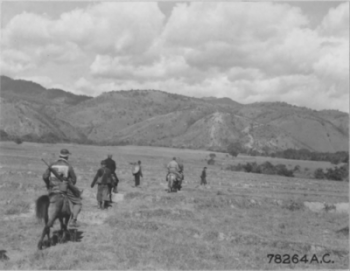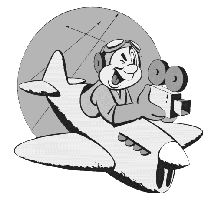S/Sgt Gough was assigned to accompany a party of men in search of a downed Japanese aircraft. They left Kunming on 11 Feb 44. Upon his return Sgt Gough reported:
Proceeded by jeep down the Burma Road to Paoshan and thence to the end of the normally travelled road to Ninwang, China – driving in almost continual rain which toward the end of the trip reached almost monsoon intensity. We got WET!! The party at this point consisted of Lt. Loehr, Technical Intelligence Officer, Cpl. Yee, Chinese-American interpreter, and myself.
At Ninwang, a Lt. White of the paratroopers, who was on a reconnaissance mission, joined us. So one other jeep had gone as far as Shihtien, China – so did we – along narrow slippery dikes running between the paddies and a small river. Then, against the advice of Chinese and Americans alike, we proceeded on by jeep up the mountains of Yaokwan (which none had ever done before). The roadway was a block stone trail, 89 (I counted ‘em) step as it climbed the mountains. The steps varied from 4 inches to a maximum of 17 inches (measured). The width of the road never exceed that of a jeep tread more than 10 to 12 inches, and at several points the tires of the jeep extended over both sides as much as half the width of the tires. Several times in climbing these steps, one or more wheels bounced off the road into the ditch on either side, leaving the jeep hung up on spring shackles or the axle. We even had to enlist the aid of passing Chinese to help build up the runways under the wheels. We carried boards to use to widen the narrow bridges we had to cross on the trip.
One bridge was too narrow to be helped even by the boards so we went right down the bank, forged the stream, and up the other bank. A Chinese to whom we were giving a ride, promptly asked to be let off. Last we saw of him, he was plodding along I our wake.
During this part of the trip, while I was perched on the hood directing Lt. Loehr along the narrow causeway, bullets began glancing off the roadway. You never saw anyone leave a jeep as fast as I did. After we picked up our weapons we returned fire of the 4 or 5 unidentified gentry at the same range which was too long to be effective for either side. The enemy decamped very promptly, probably because of Lt. White’s ‘tommy gun.’ From then on, Lt. White rode the luggage pile keeping on the alert.
Just before entering Yaokwan, we had to cross a long causeway the entire length of which was narrower than the jeep – Whew! We arrived in town in the evening, the first jeep ever there. The crowd that gathered as a result made our progress quite difficult.
From Yaokwan we went by pack train 2,000 feet or so up one side of a mountain range and down 5,000 feet on the other side, into Wantien Valley and on to Wantien itself. No white man had been down there before. We had a bodyguard of six riflemen and two men with light machine-guns with a Chinese Captain from the Chinese Army. We became separated from out pack mules and so, as we passed no towns all day, we went hungry from our start in the morning until they caught up with us at Wantien, quite a bit later.

In the valley, the people were mainly Burmese in extraction. The women wore large, black turbans and some of them wore brilliant yellow ‘night shirts’ and a scarlet skull cap. They speak Yunnan dialects [of Chinese], but with a marked ‘Southern accent.’ The valley was very warm and had a tropical bamboo and banana growth. In one jungle-like section we saw monkeys.
At Wantien, we located the stripped remains of one “Oscar” Mark II. We looked for, but were unable to locate, our real objective, a town called Lingwah, which even the natives had never heard of. While searching for Lingwah, we did [find] another spot where the natives said there had been another plane down. There was nothing to photograph on either side.
The village elder gave us his quarters at Wantien for the night, and while we undressed, while we slept, and while we dressed again in the morning it seemed there was a continuous stream of female sight-seers passing through our boudoir! Some of them were very easy on the eyes, but we were just too tired…
While crossing the swollen Wantien River, a loose saddle and the fact that my feet were high in the air to keep them out of the water almost sent me into the drink with cameras, gun and all.
Our return trip had a great deal more climb in it and the ponies gave out some three-quarters of the way back to Yaokwan, about 10 at night.
News of the jeep had spread and crowds lined the way back to Ninwang where we left Lt. White. The rest of the trip was just the tiring grind of “getting back.”
